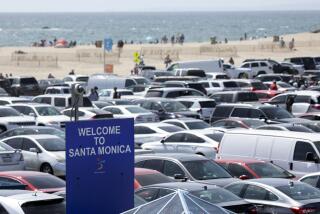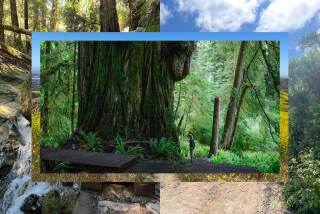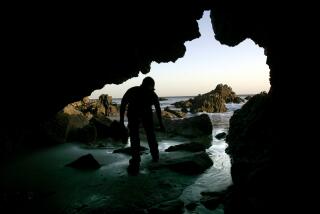Governor Will Boost Park Fees to New Highs
Gov. Arnold Schwarzenegger will raise state park fees to their highest levels ever, making California one of the most expensive places in the country for a family to spend time outdoors in a government-run park.
State officials disclosed Tuesday that beginning July 1, the daily cost for a family to camp at a state park will nearby double, from a maximum of $13 to $25. As part of a new sliding scale, fees will be higher during times such as the Memorial Day weekend when demand is greatest.
Annual passes will rise from $67 to a maximum of $125.
The parks department expects to raise an additional $18 million annually as a result of the new fees.
A year ago, former Gov. Gray Davis, facing his own budget woes, increased the same fees for activities ranging from camping along the Santa Barbara County coast to boating in Lake Tahoe to visiting Hearst Castle.
But California State Parks Director Ruth Coleman said that âafter repeated budget reductions, we have reached the point where there is no choiceâ but to raise fees once again to avoid closing more than 100 parks and laying off more than 1,000 employees.
The increases do not need legislative approval.
Californiaâs park system is the largest in the nation outside Hawaii and Alaska. It includes 277 parks with more than 15,000 campsites, 280 miles of coastline and 3,000 miles of trails. It is also the most popular in the entire country, with more than 85 million visits annually -- a number that has increased 34% in the last four years.
Former Gov. Pete Wilson, who raised park fees by substantial amounts in response to budget shortfalls during the recession of the early 1990s, faced a political backlash afterward.
Numerous groups charged that by increasing the cost of camping and visits to state museums and historic sites, Wilson was effectively denying poorer residents the chance to enjoy some of the Golden Stateâs most treasured assets.
Park attendance subsequently dropped and Wilson never realized the revenue gains he had hoped to receive from the fee increases.
Davis, who succeeded Wilson, slashed the fees in half in 2000 -- before reluctantly having to restore them when he faced a financial crisis.
Under Schwarzenegger, the hikes will push fees above Wilson-era levels to a new high.
Some environmental groups criticized Schwarzenegger for raising the park fees, saying that he should instead target âpollutersâ and businesses that use state lands.
âMaking citizens pay higher fees to get into their own parks in an attempt to balance the budget is simply ridiculous,â said Dan Jacobson, legislative director of Environment California.
Some park advocates said that the likely alternative -- closing parks -- would have been far worse for the public.
âAfter years of budget cuts, we have reached the point where this is probably the only sensible choice,â said Sara Feldman, Southern California director of the California State Parks Foundation, a nonprofit group that promotes the parks.
Asked to comment on how the increases square with Schwarzeneggerâs campaign promise not to raise taxes, aides said that there was a technical difference between fees and taxes, and that the governor had not broken his no-new-tax vow.
âThis is not a tax,â state parks spokesman Roy Stearns said Tuesday. âPeople have no choice but to pay a tax. People have a choice as to whether they want to pay this fee. Itâs like going to the movies.â
California parks officials noted that a number of states, including Washington, Florida, Michigan and Texas, have raised park fees recently in response to budget troubles.
They pointed out that several Northeastern states, including New Hampshire and Connecticut, charge camping fees similar to Californiaâs new rates.
Officials conceded that the new fees will make California an expensive place to camp compared with many other Western states. Colorado, for example, charges $12 for daily use of a basic campsite, less than half of what California will charge under the new rates.
Moreover, an annual pass to California state parks will be more than twice as much as the cost of a yearly pass to the national parks system.
Stearns said the fees will differ from area to area, and even from month to month, fluctuating with demand.
âThe fee we will charge on the Fourth of July at Huntington Beach will be different than ... a Tuesday in April,â he said.
Officials said that since California began to experience financial problems in 2001, the parks budget has been cut by nearly $20 million, to $272 million.
As a result, the Parks and Recreation Department has reorganized its management structure and consolidated 23 park districts into 18, reducing its work force by 200. The department employs more than 2,200 permanent and 1,500 seasonal workers.
As part of the budget for the next fiscal year, state parks funding is set to be cut once again, by about $15 million. The $18 million in additional revenue from the fee hikes would more than offset that impending cut. The figure assumes a decrease in attendance as a result of the fee increases.
Some of the extra money -- $1 million -- will be used to hire more seasonal workers to collect the fees at kiosks and entrance stations.
The remaining $2 million will be used for park maintenance, officials said. Because it has been deferring repairs since the 1980s, California now has a $600-million backlog of 1,200 park maintenance projects.
At Carpinteria State Beach, where several hundred families were comfortably bivouacked for the week along a mile-long swath of sand with views of the Channel Islands, many campers responded to the news with resignation.
Munching a homemade burrito at a wooden picnic table, Los Angeles Police Officer Tyler Izen said the fee increase for his spot -- from $26 nightly in the high season to $39 -- would not keep him from returning to one of the few coastal parks in Southern California with full utility hookups for his recreational vehicle.
âMy wife wants her TV,â he said, âand I want my wife to have a smile.â
Like others, Izen was more bemused than outraged by the pending increases -- especially following the dramatic fee reductions under Davis.
âThat was kind of foolish in the first place,â he said. âThey could have kept the rates where they were and used them to fix up the parks.â
Mike Siebers, a glazing contractor from Simi Valley, sounded a common theme. He said he was OK with the rate hike -- as long as the money actually is spent on the stateâs parks.
âI donât want it paying off the deficit,â he said. âThat would just be outrageous.â
Nearby, Eric Newberg, taking in the panoramic ocean view with his wife, Teresa, said the fee hikes probably wouldnât make the spot any less popular. As it is, most campers made their reservations for this week at least six months ago.
âThey could charge $60 a day and the place would still be packed,â said Newberg, a semi-retired businessman from Woodland Hills. âItâs a very good value.â
*
(BEGIN TEXT OF INFOBOX)
Hike in the parks
The stateâs park fees will rise to their highest levels ever.
*--* Present fee New fee as of July 1 Day use $3 to $5 $4 to $14 Camping, family $8 to $13 $11 to $25 Camping, group $12 to $270 $14 to $450 Boat launching $2 to $4 $5 to $8 Museums and historical sites $2 to $4 $2 to $8 Annual passes $67 $75 to $125 Annual boat pass $45 $75 Hearst Castle $7 to $12 $8 to $25 ($30 for evening tours)
*--*
Note: The new fee structure is posted on the California State Parks website, www.parks.ca.gov, under Reservations and Fees.
Source: California Department of Parks and Recreation
More to Read
Sign up for Essential California
The most important California stories and recommendations in your inbox every morning.
You may occasionally receive promotional content from the Los Angeles Times.











